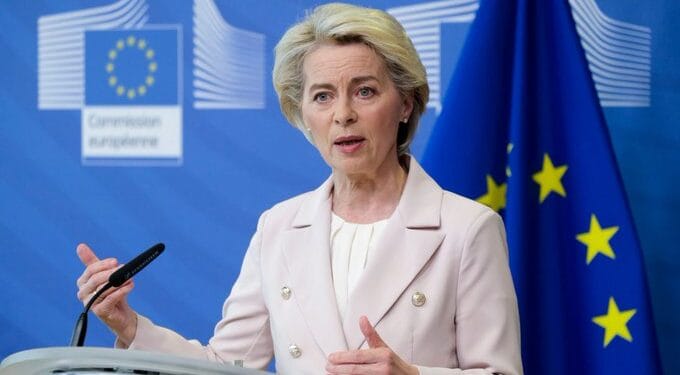European Commission President Ursula von der Leyen is under intense scrutiny following her July 27 agreement with U.S. President Donald Trump on a U.S.-EU trade framework, setting a 15% tariff on most EU goods.
The deal, announced at Trump’s Turnberry golf course in Scotland, has sparked criticism for its perceived concessions, with figures like Hungarian Prime Minister Viktor Orbán labeling it a “humiliating surrender.”
Von der Leyen’s leadership, already tested by a recent no-confidence vote, faces further challenges as EU member states question the trade deal’s impact on European economies, particularly Germany’s export-driven market.
The trade agreement, which includes $750 billion in U.S. energy purchases over three years and zero tariffs on strategic products like aircraft and certain chemicals, aims to stabilize transatlantic trade amid Trump’s threats of a 30% levy.
Von der Leyen described it as providing “stability and predictability” for businesses, but critics argue it disproportionately benefits the U.S. German businesses, heavily reliant on exports like cars and pharmaceuticals, expressed shock at the deal’s terms, with Euronews reporting concerns about economic damage.
The agreement requires further EU approval, with member states and lawmakers set to review details in coming weeks, raising doubts about its ratification.
Von der Leyen’s tenure, marked by her navigation of the COVID-19 pandemic and Russia’s invasion of Ukraine, has been both lauded and contentious.
Her recent Charlemagne Prize, awarded in Aachen on May 29, 2025, recognized her role in advancing EU unity, with German Chancellor Friedrich Merz praising her “European voice.”
However, controversies like the “Pfizergate” scandal, where the European Court of Justice ruled she violated transparency norms by blocking access to her texts with Pfizer’s CEO during vaccine negotiations, have fueled distrust.
Citizens shown polarized views, with some calling her a unifying force and others, warning of an Orwellian surveillance system under her leadership.
The trade deal’s fallout has intensified scrutiny of von der Leyen’s leadership. French President Emmanuel Macron and others have criticized the agreement as a capitulation, with Politico noting divisions among member states over its balance.
Von der Leyen’s push for EU strategic autonomy, including defense and technological independence, is now at odds with perceptions of weakness in U.S. negotiations.
Her recent pneumonia diagnosis, reported by Euronews, forced her to cancel engagements, yet she continues to manage duties from Hannover, underscoring her resilience amid health challenges.
The trade deal’s implications, particularly for steel tariffs and Ireland’s exports, remain contentious, with Irish Taoiseach Micheál Martin calling for detailed studies.
Von der Leyen’s leadership also faces external pressures, including Russia’s war in Ukraine, where she has advocated using frozen Russian assets for Ukrainian military support and praised a 30-day ceasefire proposal.
Her efforts to strengthen EU-India ties and rearmament strategies reflect her broader vision, but domestic criticism persists. The no-confidence vote in July, defeated 360-175, highlighted allegations of election interference and fund misuse, though von der Leyen dismissed it as a “far-right PR stunt.”
Her alignment with the European People’s Party (EPP) and occasional cooperation with hard-right groups have drawn ire from progressive lawmakers, complicating her coalition-building efforts.
As the EU navigates this turbulent period, Ursula von der Leyen’s leadership remains pivotal. The trade deal’s ratification process will test her ability to unify member states, with critics like Orbán calling it a low point for her tenure.
Her health challenges add complexity, yet her commitment to duties from Hannover signals determination. The coming weeks will be critical for her legacy and the EU’s economic stability.
Ursula von der Leyen’s leadership is at a crossroads, with the trade deal exposing fault lines in EU unity. Her ability to address concerns while advancing strategic goals will define her second term.
The scrutiny surrounding her decisions underscores the high stakes for Europe’s global standing. Ursula von der Leyen’s leadership faces intense scrutiny over the U.S.-EU trade deal and ongoing health concerns.
Her vision for an independent Europe, bolstered by the Charlemagne Prize, contrasts with criticisms of her negotiation tactics. As she manages duties from Hannover, von der Leyen’s ability to navigate these challenges will shape the EU’s future and her legacy as a unifying leader.















